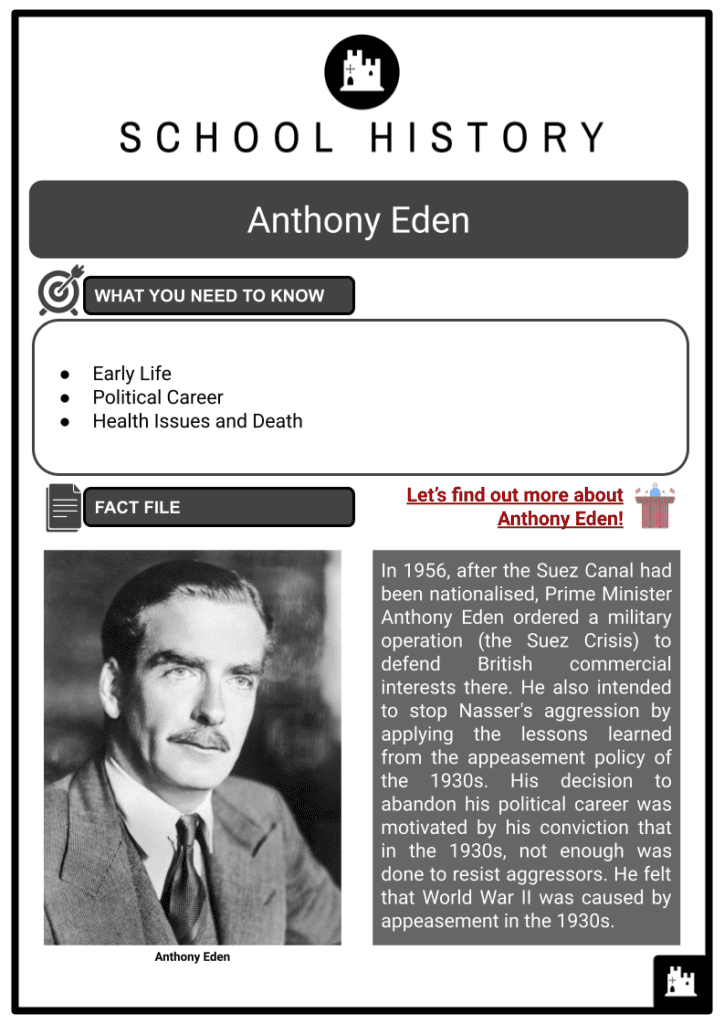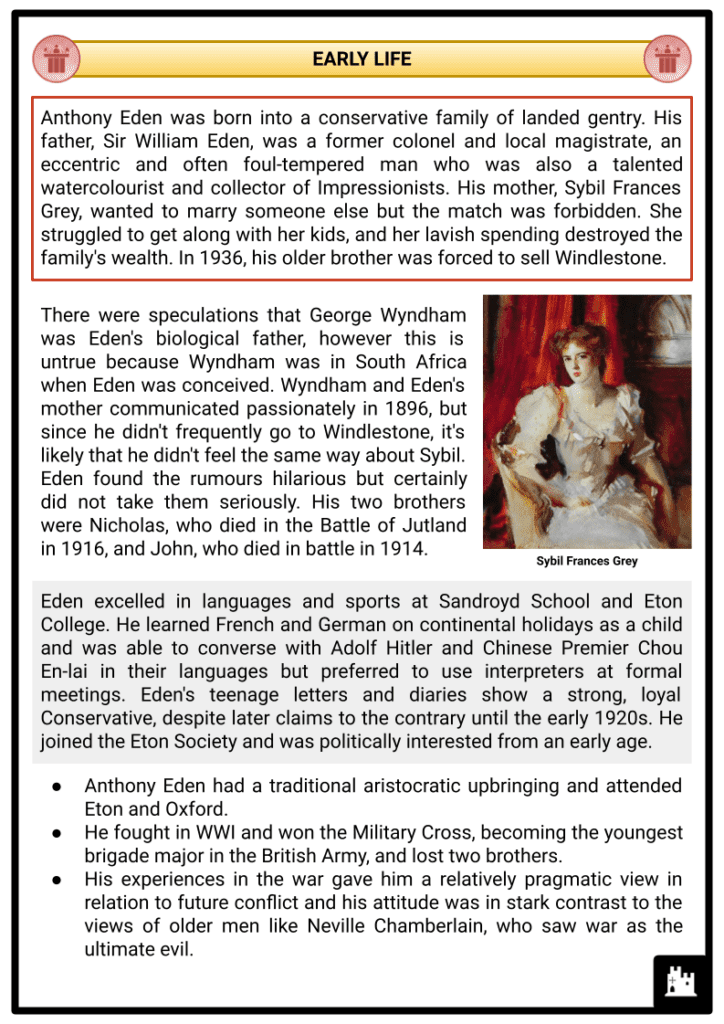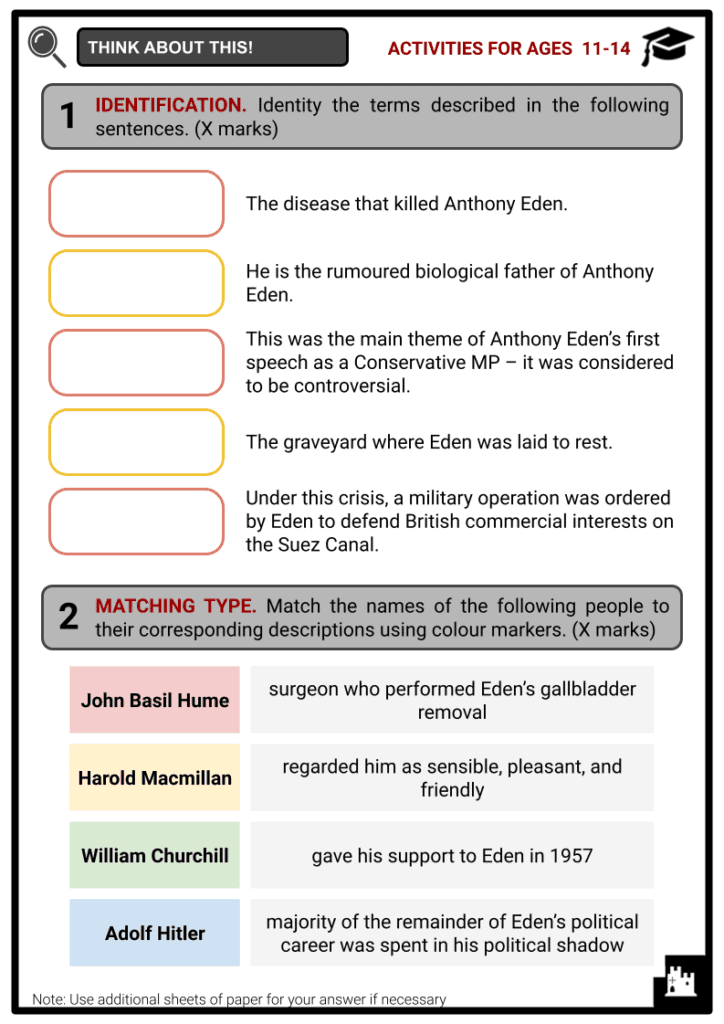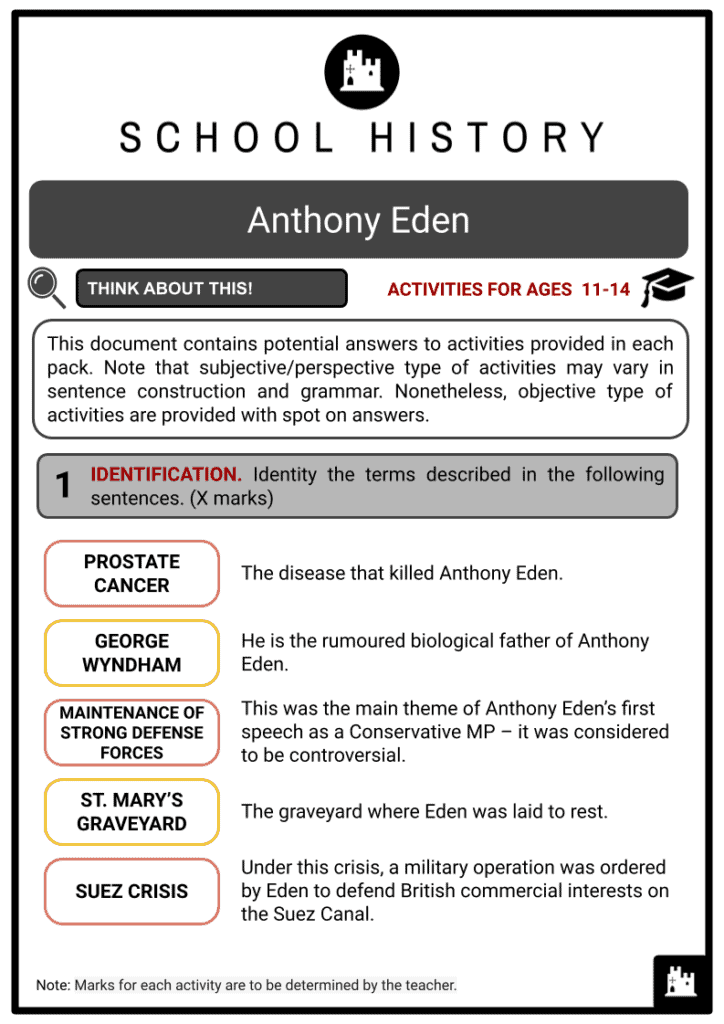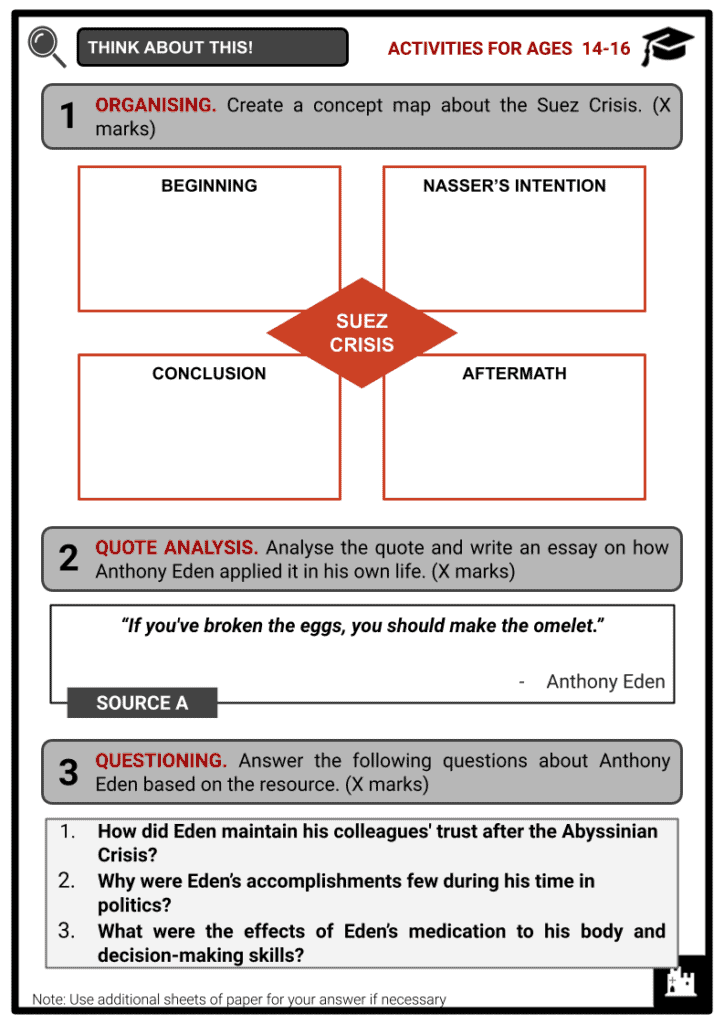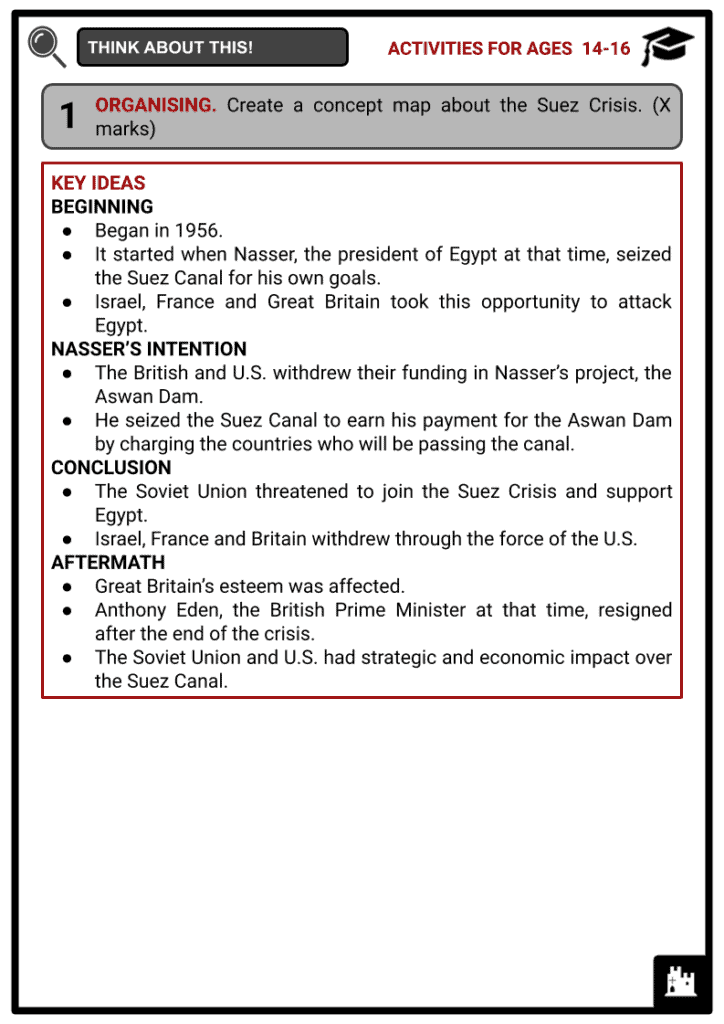Anthony Eden Worksheets
Do you want to save dozens of hours in time? Get your evenings and weekends back? Be able to teach about Anthony Eden to your students?
Our worksheet bundle includes a fact file and printable worksheets and student activities. Perfect for both the classroom and homeschooling!
Summary
- Early Life
- Political Career
- Health Issues and Death
Key Facts And Information
Let’s find out more about Anthony Eden!

In 1956, after the Suez Canal had been nationalised, Prime Minister Anthony Eden ordered a military operation (the Suez Crisis) to defend British commercial interests there. He also intended to stop Nasser's aggression by applying the lessons learned from the appeasement policy of the 1930s. His decision to abandon his political career was motivated by his conviction that in the 1930s, not enough was done to resist aggressors. He felt that World War II was caused by appeasement in the 1930s.
EARLY LIFE
- Anthony Eden was born into a conservative family of landed gentry. His father, Sir William Eden, was a former colonel and local magistrate, an eccentric and often foul-tempered man who was also a talented watercolourist and collector of Impressionists. His mother, Sybil Frances Grey, wanted to marry someone else but the match was forbidden. She struggled to get along with her kids, and her lavish spending destroyed the family's wealth. In 1936, his older brother was forced to sell Windlestone.
- There were speculations that George Wyndham was Eden's biological father, however this is untrue because Wyndham was in South Africa when Eden was conceived. Wyndham and Eden's mother communicated passionately in 1896, but since he didn't frequently go to Windlestone, it's likely that he didn't feel the same way about Sybil. Eden found the rumours hilarious but certainly did not take them seriously. His two brothers were Nicholas, who died in the Battle of Jutland in 1916, and John, who died in battle in 1914.
- Eden excelled in languages and sports at Sandroyd School and Eton College. He learned French and German on continental holidays as a child and was able to converse with Adolf Hitler and Chinese Premier Chou En-lai in their languages but preferred to use interpreters at formal meetings. Eden's teenage letters and diaries show a strong, loyal Conservative, despite later claims to the contrary until the early 1920s. He joined the Eton Society and was politically interested from an early age.
- Anthony Eden had a traditional aristocratic upbringing and attended Eton and Oxford.
- He fought in WWI and won the Military Cross, becoming the youngest brigade major in the British Army, and lost two brothers.
- His experiences in the war gave him a relatively pragmatic view in relation to future conflict and his attitude was in stark contrast to the views of older men like Neville Chamberlain, who saw war as the ultimate evil.
- Eden became a Conservative MP in 1923 and specialised in overseas and defense issues. His first speech was controversial, arguing for the maintenance of strong defense forces. In the later 1920s, he worked closely with Austen Chamberlain, the Foreign Secretary, to preserve international security and limit Britain's commitments beyond the empire.
- He supported the rejection of the Geneva Protocol in 1925 which would have given the League of Nations some military capability but would also have heightened Britain's global commitments. He believed the League of Nations to be a tool to preserve Britain's security with minimal effort and resources.
POLITICAL CAREER
- Eden became increasingly closely identified with the League of Nations' advocacy as the key to preserving peace in the early 1930s. He promoted a pro-League image and argued for Britain's stronger commitment to the League. He was seen as the great hope who would overcome the hesitation of older generation politicians and advance the cause of international cooperation when, in 1931, he was appointed as a junior minister with specific duties for League issues.
- In 1957, Prime Minister Harold Macmillan stated that he "unhesitatingly gave my support to Eden, who seemed to embody all the aspirations of the war generation."

Macmillan - The fact is that Eden juggled a delicate line between trying to protect Britain's position and keeping her commitments to a minimum while also attempting to promote negotiation and agreement through the League, including visits to Berlin and Moscow, where he was the first western minister to be received by Stalin.
- He also took care to avoid offending influential Conservatives like Neville Chamberlain and Stanley Baldwin, whose backing his future career depended on.
- Eden's demeanor at the Geneva Disarmament Conference (1932–1934) betrayed dissatisfaction with the French, who looked utterly reluctant to compromise, and sympathy with the German stance. Eden regarded Hitler as sensible, pleasant, and friendly after meeting him in 1934. Eden was particularly enraged by the French talks with the Soviet Union about forming an alliance because he thought, with some justification, that this action would put Germany in a difficult position. Eden continued to believe that Germany could be persuaded for a while.
- The Abyssinian Crisis reaffirmed Eden's suspicions that Mussolini's Italy represented a serious threat to peace. He eventually became the foreign secretary at age 38 as a result of this situation. The Hoare-Laval Pact, which would have handed Mussolini control of Abyssinia, had damaged Hoare's reputation. The sale sparked a global uproar, but Eden, who was involved, avoided scrutiny and received compensation for his alleged part in the catastrophe, strengthening his image. He maintained his colleagues' trust by taking judgments and placated the internationalists by coming off as more intelligent than his peers.
- The pursuit of a legally enforceable arrangement with the tyrants about territorial issues and the transfer of armaments dominated Eden's time as foreign secretary. Despite later claims to the contrary, he was clearly an appeaser, but his definition of appeasement was tied to the requirement that all parties make concessions in any conversations and accords. This is in contrast with the strategy used in Munich in September 1938, where Germany received all she requested in exchange for no concessions.
- Eden rejected regional alliances and pacts that other nations would view as a threat and worked to build broad support for agreements that would ensure stability on a global scale.
- Even though it was obvious that other nations were defying this policy to try to keep the Spanish Civil War under control, he advocated for non-intervention in the conflict.

Eden with French Prime Minister at Geneva - In a speech, he said that Britain would not join any anti-communist or anti-fascist bloc and would not submit to foreign dictate, encouraging collaboration and resisting those who sought to undermine it.
- The poor economy, weak military, and public opposition to overseas obligations in Britain meant that the reality did not match the rhetoric.
- Eden believed that Germany was becoming a bigger menace to world peace than Italy and Japan. Due to a difference of opinion on Prime Minister Chamberlain's policy toward Italy, he resigned from his position as Foreign Secretary in 1938. Eden had grown doubtful about their commitment to peace by the time Chamberlain thought he was hesitant to negotiate with Mussolini and Hitler. Until Hitler's actions in 1939, which tarnished his reputation, Chamberlain persisted in his appeasement strategy.
- Eden's departure caused him to hesitantly embrace the necessity for a stronger stance against the tyrants. He was never quite able to fully commit to a stance that directly challenged government policy, though. As a result, Churchill, not Eden as some had hoped, was the one to issue the call to action to combat those who want to use aggressiveness to further their goals.
- Due to his reluctance to publicly oppose Chamberlain and his erstwhile allies, Eden was forced to spend the majority of the remainder of his political career in Churchill's political shadow. In 1940, he was appointed as Churchill's foreign secretary, but Churchill continued to play a significant role in international affairs and to lead the Conservative Party until his retirement in 1955. Finally, Eden gained over, but only until he resigned a year later during the Suez Crisis.
- Between 1931 and 1957, Eden served as a talented and devoted politician who spent the most of his time on the front bench of the Conservative Party.
- He was a representative of the establishment, thus he was cautious to disagree with his party's stance and favored negotiation over conflict.
- This explains his political success but also makes clear why his accomplishments were few. He stayed away from danger.
- He may have decided on the Suez operation in 1956 as a result of realising he had wasted possibilities in the 1930s, but by that point, the opportunity had already passed.
HEALTH ISSUES AND DEATH
- Eden had a stomach ulcer and gallstones, which required surgery to remove the gallbladder in the 1920s. The surgery was performed by John Basil Hume, a surgeon from St. Bartholomew's Hospital, London, United Kingdom. The normal bile duct is thought to have been infected during the operation, making Eden more prone to recurring infections, biliary blockage, and liver failure. In order to cure recurring stricturing of the right hepatic duct, he underwent further revisional operations three more times in Boston, Massachusetts. He had cholangitis, an infection of the abdomen.
- In the 1950s, the stimulant medication Benzedrine was a regular prescription for Eden. It is a member of the amphetamine drug family, which was once often prescribed and taken.
- However, it results in restless nights, mood swings, and sleeplessness, all of which Eden experienced during the Suez Crisis.
- In addition, he bemoaned his inability to get more than five hours of sleep each night.
- His drug use, according to some historians, may have contributed to his poor decision-making during his premiership, but the Thorpe biography refutes this theory and notes that Eden's medical records at Birmingham University do not corroborate the charges.
- Eden admitted to his dependence on stimulants in his resignation document but denied that they affected his judgment during the Suez crisis in 1956. He wrote that he had to increase the drugs and stimulants he took to counteract their effects, which had an adverse effect on his health. However, historian Hugh Thomas claimed in his book The Suez Affair that Eden revealed to a colleague that he was "practically living on Benzedrine" at the time. He took a combination of sedatives, opioid painkillers and corresponding stimulants to counteract their effects, including Promazine, Dextroamphetamine, Sodium Amytal, Secobarbital, Vitamin B12 and Pethidine.
- In order to celebrate Christmas and New Year's with Averell and Pamela Harriman, Eden felt well enough to go to the United States with his wife in December 1976; but, once there, his health quickly deteriorated. In order to get him home, Prime Minister James Callaghan arranged for an RAF jet that was already in America to make a detour to Miami.
- At the age of 79, Anthony Eden passed away from prostate cancer that had spread to his bones and mediastinal nodes at his Wiltshire home, Alvediston Manor. Clarissa was his surviving spouse. In Alvediston, Wiltshire, just three miles upstream from "Rose Bower," the River Ebble's source, he was laid to rest in St. Mary's graveyard. The University of Birmingham Special Collections is where Eden's papers are kept.

